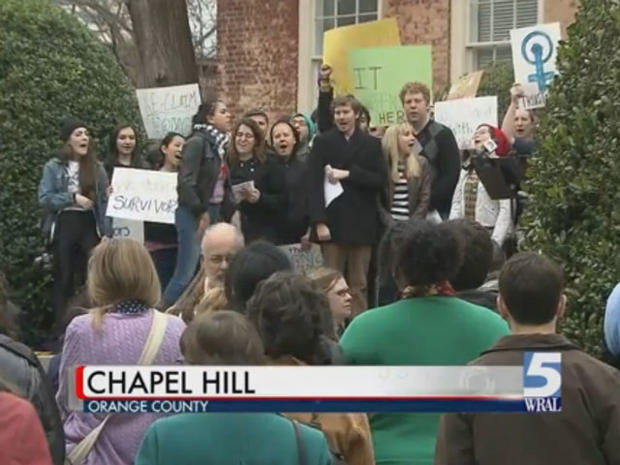UNC-Chapel Hill faces Dept. of Education probe over handling of sexual assault cases
(CBS) - The federal Department of Education's Office for Civil Rights says it is launching an investigation into how the University of North Carolina-Chapel Hill handles sexual assault complaints by students.
In January, three current students, an alumna and a former dean filed a complaint alleging that the university "failed to appropriately respond to concerns of sexual harassment, provide appropriate grievance procedures, provide adequate and impartial investigations, and provide appropriate training regarding sexual harassment, including sexual assault/sexual violence," according to a spokesperson for the DOE.
According to one of the complainants, former Assistant Dean of Students Melinda Manning, until August 2012 all reports of sexual assault by students were handled by the student-run Honor Court.
Manning says that UNC put students in charge of collecting and examining evidence in sexual assault "cases" and making decisions about guilt - but with almost no training.
"They were in over their heads," Manning told CBS News' Crimesider.com.
Manning resigned last year because she says she was "exhausted after 11 years of fighting and being profoundly disappointed in how my institution was handling sexual assault cases."
Two of the student complaintants, junior Andrea Pino and 2011 graduate Annie Clark, say that the problem goes well beyond the Honor Court. As a first-year student at UNC in 2007, Clark says she was sexually assaulted, but when she went to report the crime to an administrator, she says she was shocked at the response.
"I was told, 'Rape is like football, you know, if you look back on the game, and you're the quarterback, Annie, is there anything you would have done differently?,'" she told Crimesider.
In an interview with Crimesider, Pino, 21, said she was sexually assaulted at a party last year and she had no idea where to turn for help.
"There is no central way of reporting sexual assault," she said.
The assault affected her mental health and ability to study, but she says that when she asked to withdraw from a class, she was called "lazy." When she started speaking out about her experience, Pino says that other students started coming to her with their tales of assault.
"I set up a meeting with the administration and said, 'All these women are coming to me and I don't know what to do.'" Pino says the administration's response was that the system in place was adequate.
But Pino disagrees: "There is a pervasive culture of silence and shame."
In a statement issued Thursday, the university said it "will respond appropriately to the [Office of Civil Rights'] request for information and cooperate fully with the investigation."
According to the university, the student-run Honor Court no longer addresses sexual assault complaints. Instead, a new system has been put in place where a student can file a report with the Equal Opportunity Office and, if an investigation reveals there is cause to move the case forward, it will be brought before a Student Grievance Committee, which consists of a student, a faculty member, and a staff member.
In addition, the school says they invited an outside expert to campus "to guide an open and transparent conversation" about the issue, and created a website to guide students on sexual assault policies.
In an email to students on Friday, the university's chancellor's office outlined these changes, pledged cooperation with the DOE investigation, and stated that "There is more work to be done, and we are committed to making additional changes that will improve the way sexual assault cases are handled at the University."
The DOE investigation of UNC follows a pattern of problems with how universities across the country handle sexual assault of, and by, students. A 2010 investigation by the non-profit Center for Public Integrity found that "students found 'responsible' for sexual assaults on campus often face little or no punishment from school judicial systems."
Yesterday, when President Obama signed the re-authorization of the Violence Against Women Act, the act included the Campus Save Act, which requires universities and colleges to create policies on sexual assault and dating violence, and increases reporting requirements for such incidents.

